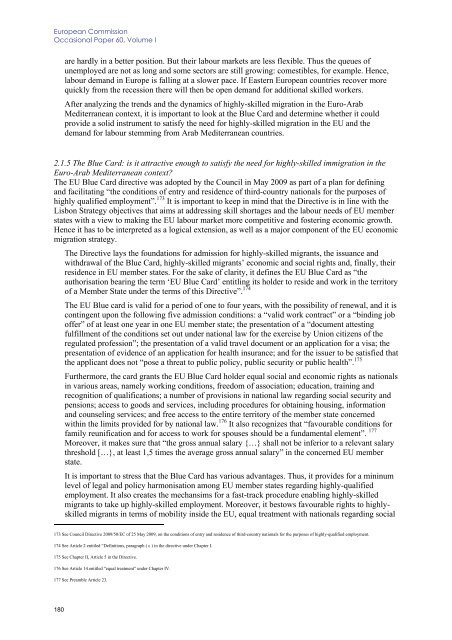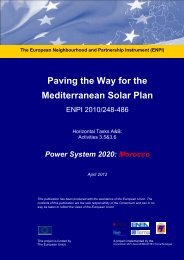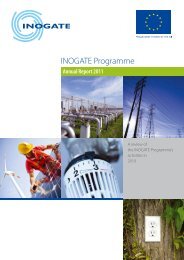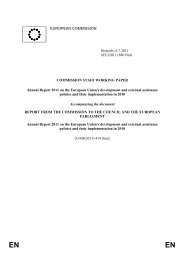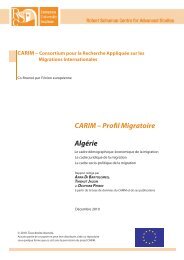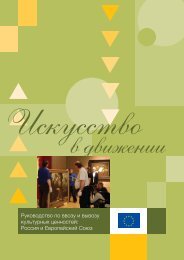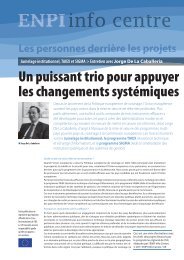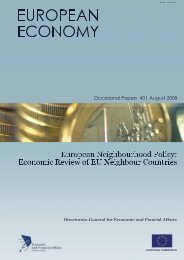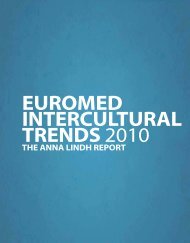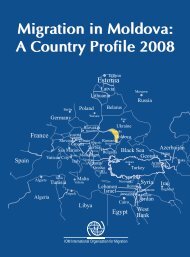Labour market performance and migration flows - European ...
Labour market performance and migration flows - European ...
Labour market performance and migration flows - European ...
Create successful ePaper yourself
Turn your PDF publications into a flip-book with our unique Google optimized e-Paper software.
<strong>European</strong> CommissionOccasional Paper 60, Volume Iare hardly in a better position. But their labour <strong>market</strong>s are less flexible. Thus the queues ofunemployed are not as long <strong>and</strong> some sectors are still growing: comestibles, for example. Hence,labour dem<strong>and</strong> in Europe is falling at a slower pace. If Eastern <strong>European</strong> countries recover morequickly from the recession there will then be open dem<strong>and</strong> for additional skilled workers.After analyzing the trends <strong>and</strong> the dynamics of highly-skilled <strong>migration</strong> in the Euro-ArabMediterranean context, it is important to look at the Blue Card <strong>and</strong> determine whether it couldprovide a solid instrument to satisfy the need for highly-skilled <strong>migration</strong> in the EU <strong>and</strong> thedem<strong>and</strong> for labour stemming from Arab Mediterranean countries.2.1.5 The Blue Card: is it attractive enough to satisfy the need for highly-skilled im<strong>migration</strong> in theEuro-Arab Mediterranean context?The EU Blue Card directive was adopted by the Council in May 2009 as part of a plan for defining<strong>and</strong> facilitating “the conditions of entry <strong>and</strong> residence of third-country nationals for the purposes ofhighly qualified employment”. 173 It is important to keep in mind that the Directive is in line with theLisbon Strategy objectives that aims at addressing skill shortages <strong>and</strong> the labour needs of EU memberstates with a view to making the EU labour <strong>market</strong> more competitive <strong>and</strong> fostering economic growth.Hence it has to be interpreted as a logical extension, as well as a major component of the EU economic<strong>migration</strong> strategy.The Directive lays the foundations for admission for highly-skilled migrants, the issuance <strong>and</strong>withdrawal of the Blue Card, highly-skilled migrants’ economic <strong>and</strong> social rights <strong>and</strong>, finally, theirresidence in EU member states. For the sake of clarity, it defines the EU Blue Card as “theauthorisation bearing the term ‘EU Blue Card’ entitling its holder to reside <strong>and</strong> work in the territoryof a Member State under the terms of this Directive”. 174The EU Blue card is valid for a period of one to four years, with the possibility of renewal, <strong>and</strong> it iscontingent upon the following five admission conditions: a “valid work contract” or a “binding joboffer” of at least one year in one EU member state; the presentation of a “document attestingfulfillment of the conditions set out under national law for the exercise by Union citizens of theregulated profession”; the presentation of a valid travel document or an application for a visa; thepresentation of evidence of an application for health insurance; <strong>and</strong> for the issuer to be satisfied thatthe applicant does not “pose a threat to public policy, public security or public health”. 175Furthermore, the card grants the EU Blue Card holder equal social <strong>and</strong> economic rights as nationalsin various areas, namely working conditions, freedom of association; education, training <strong>and</strong>recognition of qualifications; a number of provisions in national law regarding social security <strong>and</strong>pensions; access to goods <strong>and</strong> services, including procedures for obtaining housing, information<strong>and</strong> counseling services; <strong>and</strong> free access to the entire territory of the member state concernedwithin the limits provided for by national law. 176 It also recognizes that “favourable conditions forfamily reunification <strong>and</strong> for access to work for spouses should be a fundamental element”. 177Moreover, it makes sure that “the gross annual salary {…} shall not be inferior to a relevant salarythreshold […}, at least 1,5 times the average gross annual salary” in the concerned EU memberstate.It is important to stress that the Blue Card has various advantages. Thus, it provides for a mininumlevel of legal <strong>and</strong> policy harmonisation among EU member states regarding highly-qualifiedemployment. It also creates the mechansims for a fast-track procedure enabling highly-skilledmigrants to take up highly-skilled employment. Moreover, it bestows favourable rights to highlyskilledmigrants in terms of mobility inside the EU, equal treatment with nationals regarding social173 See Council Directive 2009/50/EC of 25 May 2009, on the conditions of entry <strong>and</strong> residence of third-country nationals for the purposes of highly-qualified employment.174 See Article 2 entitled “Definitions, paragraph ( c ) in the directive under Chapter I.175 See Chapter II, Article 5 in the Directive.176 See Article 14 entitled “equal treatment” under Chapter IV.177 See Preamble Article 23.180


